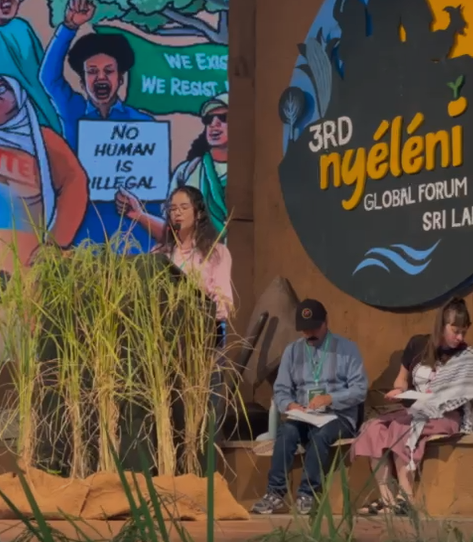
RIPESS, represented by Souhir Inas from the Réseau Marocain de l’Économie Sociale et Solidaire (REMESS), took the floor during the Nyéléni forum to share the political contexts facing its members and allies in their territories:
Today, the world stands at a crossroads. We face overlapping crises: growing inequality, crushing debt, militarisation, climate disruption and ecosystem collapse. However, instead of turning this moment into an opportunity for radical transformation, the same system prevails, marked by the domination of the Global North, the silencing of civil society voices and the marginalisation of the communities most affected by injustice.
Let us be clear: the international financial system is profoundly unjust. It systematically drains wealth from the Global South, limits the political space of our States, and deepens historical, gender, and racial inequalities. In this context, social justice, real democracy, and ecological integrity are nothing more than illusions.
That is why, at RIPESS, we are calling for a radical rethink, based on justice, equity and sustainability. We demand the principle of common but differentiated responsibilities: those primarily responsible for the current crises must take their share. We reject market-based ‘false solutions’ – debt-for-nature swaps, blended finance – that do not solve our social and ecological emergencies.
At the heart of our vision are care and food sovereignty. Unpaid care work – still mostly done by women – sustains lives, families and communities. It is also essential for producing, preparing and distributing food every day. When public care and social protection systems are dismantled or non-existent, women – especially rural and indigenous women – bear the burden. Inequality is exacerbated.
Recognising care as a human right and a public good, ensuring universal protection and investing in public care services are the foundations of fair and resilient food systems. Care work is not separate from food sovereignty; it is the basis. Local communities, through agroecology and solidarity, weave together the fabric of life, biodiversity and shared wisdom.
This truth resonates around the world. In Africa, dependence on cereals weakens sovereignty, while climate crises and land grabbing threaten the future. But farmers’ cooperatives and solidarity economies show a path to resilience. In Latin America, youth, biodiversity and gender equality are driving a solidarity economy based on dignity and justice. In North America, amid fascism and extractive capitalism, community-led cooperatives, especially those led by Black and Indigenous communities, along with alternative financing, are reclaiming power and rights. In Asia, farmers are defending seed and land sovereignty against corporate control. The social and solidarity economy is emerging in Europe as a democratic antidote to authoritarianism and neoliberal agri-business policies, fostering inclusive local food systems, land access for small farmers, and community resilience against the exclusionary logic of the EU’s Common Agricultural Policy.
Let’s be honest: it is not enough to take timid steps at the global level – such as debates on international tax justice – while abuses, debt and capital flight continue to deprive the Global South of resources and while companies escape accountability.
Our vision is clear: only structural transformation – through restorative justice, genuine democratic governance and the unity of care, food sovereignty and the social and solidarity economy – will lead to real change. The struggle for land and seeds, led by women and rural and indigenous communities, is not marginal. It is at the heart of a new social project: an economy at the service of life, not profit.
So let us call, together, for a new beginning, a global mobilisation for the profound change that our era demands. The social and solidarity economy, inextricably linked to food sovereignty, is not a niche alternative. It is the democratic, ecological and solidarity-based horizon of a world to be rebuilt.


